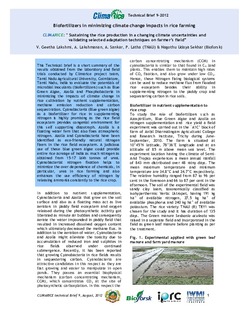Biofertilizers in minimizing climate change impacts in rice farming
Research report
Published version
Permanent lenke
http://hdl.handle.net/11250/2459221Utgivelsesdato
2012-08Metadata
Vis full innførselSamlinger
Sammendrag
This Technical brief is a short summary of the results obtained from the laboratory and field trials conducted by Climarice project team, Tamil Nadu Agricultural University, Coimbatore, Tamil Nadu, India to evaluate the potentials of microbial inoculants (biofertilizers) such as Blue Green Algae, Azolla and Phosphobacteria in minimizing the impacts of climate change in rice cultivation by nutrient supplementation, methane emission reduction and carbon sequestration. Cyanobacteria (Blue green algae) as a biofertilizer for rice in supplementing nitrogen is highly promising as the rice field ecosystem provides congenial environment for this self supporting diazotroph. Azolla is a floating water fern that also fixes atmospheric nitrogen. Azolla and Cyanobacteria have been identified as eco-friendly natural nitrogen fixers in the rice field ecosystem. A judicious use of these blue green algae could provide entire rice acreage of India as much nitrogen as obtained from 15-17 lakh tonnes of urea. Cyanobacterial nitrogen fixation helps to minimize the over dependence of chemicals, in particular, urea in rice farming and also enhances the use efficiency of nitrogen by releasing ammonia constantly to the rice crop.
